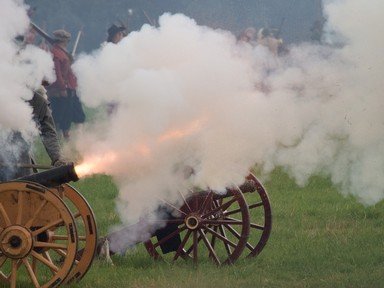11. There were three battles of Dunbar. What were the results?
From Quiz Anglo-Scottish battles
Answer:
First and third English victories, second successful Scottish Defence.
The first battle on April 27 1296 (also known as Spottsmuir) was the only one in the campaign by King Edward I of England to punish John Balliol for his refusal to support English military action in France. Edward sent one of his chief lieutenants, John de Warenne, 7th Earl of Surrey (Balliol's father-in-law) with a strong force of knights to besiege the Earl of March's castle at Dunbar. March was with the English, but his wife, Marjory Comyn, sister of the Earl of Buchan, did not agree with her husband and allowed the Scots to occupy the castle.
All the combatants seem to have been mounted. The Scots occupied a strong position; the English advanced and were disordered by crossing a gully. This provoked the Scots to charge but the English reformed and routed them. According to once source the forces were probably in the 100s and casualties were not heavy but another source says the Scots lost 10000. During this campaign Robert the Bruce was fighting for the English.
The second action was from 13 January 1338 to 10 June 1338. Dunbar was successfully defended by Agnes Randolph, 4th Countess of Moray (c.1312-1369) known as Black Agnes because of her olive skin complexion. She was the spouse of Patrick, 9th Earl of Dunbar and March and daughter of Thomas Randolph, 1st Earl of Moray. The English commander was William Montacute, 1st Earl of Salisbury, one of the best generals of the time.
Salisbury began with a bombardment by catapults, which sent huge rocks against the castle ramparts. Lady Agnes responded by having her maids dress in their Sunday best and dust the battle damage away with their handkerchiefs. Upon the next assault with a battering ram, she dropped a huge boulder captured from an earlier English attack which smashed the ram. At one point the English captured her brother John Randolph, 3rd Earl of Moray and paraded him in front of the castle with a rope round his neck, and threatened to hang him if she did not surrender. She told them to go ahead, since this would make her the proprietor of the Earldom of Moray. John survived this piece of brinkmanship.
The third battle (on 3rd September 1650) was described as Cromwell's greatest victory. He had defeated a Scottish invasion of England in 1648. The Scots had played a significant part in battles in England such as Marston Moor (although at that time they were on the same side as Cromwell). His 12,000 men defeated David Leslies 22,000 (or 14,000 English and 27,000 Scots according to another source) but Cromwell had the advantage that the Kirk controlled the army and promotion was based on religion rather than military merit. The Scots lost 3,000 casualties and 1,0000 prisoners.







